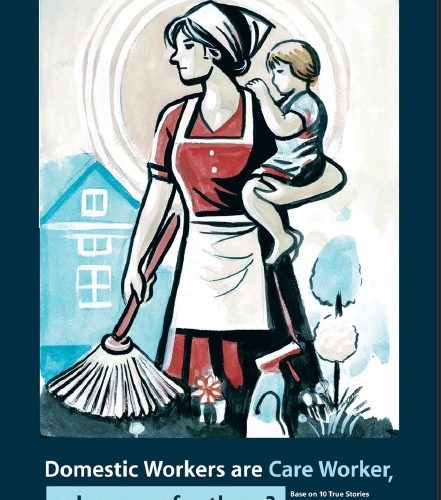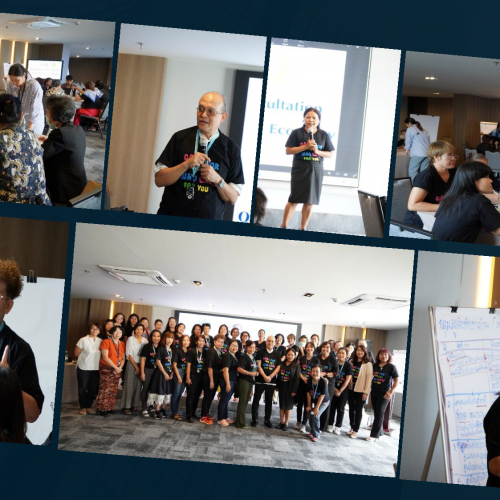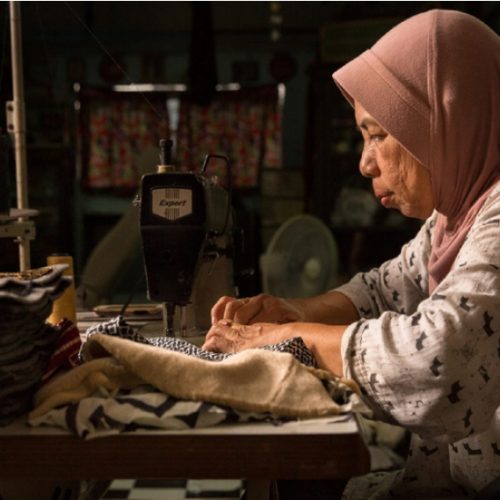Puttinee Kophatta
April 2023
In 2017, 25 home-based workers groups who are members of the Homenet Thailand Association, has established a business organization together under the name “Homenet Thailand Brand-HNTB”. It aims to develop collective marketing channels and increase the business competitiveness of members. Homenet Thailand Association and these 25 home-based workers groups are jointly invested in HNTB. Homenet Thailand Brand will function in supporting business management, product development, improving packaging and, developing various marketing channels including online marketing. So that members can sell products regularly at a fair price.
After preparation period in raising members’ knowledge and understanding of the collaboration, HNTB started to operate in earnest in 2019 with supported by Fondation Chanel in developing its organization as a social enterprise. It was registered as a company in early 2023 and next step, aims to be registered as a social enterprise under Thai law. Currently, HNTB operates across 44 home-based workers groups with more than a thousand members from 4 regions of Thailand and from Bangkok
From the outbreak of COVID-19 since 2020, the government subsequently issued a city lockdown order and implemented social distancing policies. More than 20 million tourists who have been to Thailand each year stopped visiting. Social and businesses activities ceased or not fully operation. It led to economic recession and affected the livelihood of various groups of informal workers, such as street vendors, motorcycle taxi drivers and domestic workers. While home-based workers groups which produce handicrafts and other souvenirs that must rely on tourism industry were unable to sell the products. According to a study of WIEGO and Homenet Thailand on the impacts of the COVID-19 pandemic in 2020 and 2021, it was found that in mid-2021, most of the home-based producers who are women were the most affected groups. Their average income is zero. Even in 2022, the government has policies to relax various measures for the public to carry on their activities as usual. But home-based workers still had an average income of less than 40% of their average income before the outbreak of COVID-19. HNTB has therefore initiated a link between home-based workers’ groups and linking producers’ groups with other informal workers’ groups. The first initiative is a link between raw material producers from rural areas and garment workers that specialize in sewing, cutting, and embroidering in Bangkok area. Later, linking between local food producers and urban informal workers communities in Bangkok. It is expected that linking between members groups will help to develop finished products to meet market demands and give value-added to the products as well. In addition, developing finished products can help the expansion of marketing channels of HNTB goods. Samples of business linking between Homenet Thailand Brand members are.
1.Develop of indigo-dyed products from Non-Ruea Indigo-dyed Fabric Community Enterprise Group
Non- Ruea Indigo Dyed Fabric Community Enterprise Group, Moo 13, Phannanikhom District, Sakon Nakhon Province has produced hand-woven cotton fabrics with indigo dyeing by using local wisdom inherited from their ancestor. The production process is including planting indigo, dyeing with indigo and traditional weaving by women in the community. Traditional weaving products with indigo dyeing as such can be found only in a few areas in Thailand. Besides, there are also unique patterns of the northeastern region in the Indigo-dyed cotton fabric from Non-Ruea Group. Products from their weaving came out as beautiful scarves and shawls. During the epidemic of COVID -19, these products were sold less and got cheaper price. HNTB brought these scarves and shawls to add embroidery work from Muslim Sewing Group at Lam Hin Tai Community in Bangkok which is a group of Muslim women who are skilled in embroidering their headscarves. Nowadays, hand-embroidered work and even machine embroidery is less popular because it takes a long time and has a high price. The new generation of Muslim women prefer to wear headscarves making from more fashionable patterned fabrics than embroider products. It made these groups of Muslim women have no job. Bringing indigo-dyed cotton to embroider here giving the products of Non-Ruea look different from others in Sakon Nakhon Province. Helps to increase the variety of shopping choices for customers and can be value-added to indigo-dyed fabric products. At the same time, it helps the embroidery group of Muslim women to have job. These embroidered indigo scarves and shawls received a good response from customers and helped generating income for more than 50 members of weavers and embroiderers to earn more during COVID-19 crisis.
2. Develop finished products from naturally dyed fabric from Panmai Group
Panmai group was formed by women weavers’ group who produce traditional cloth weaving with naturally dyed in 3 provinces in the northeast of Thailand, namely Roi Et, Surin and Srisaket. Currently, there are 179 members, inherited traditional cloth weaving with naturally dyed techniques from ancestors and developed modern silk and cotton products. The group products have generated income for these weavers and their families for more than 30 years. They have both domestic and international customers. In 2020, the outbreak of COVID-19 has resulted to wholesale customers to stop operating. These customers used to buy woven fabrics from Panmai group to export. Therefore, many of the group’s woven fabrics remain in inventory.
Homenet Thailand Brand, therefore, took the hand-woven fabrics from Panmai Group to the Women’s Housing Group of Thung Song Hong Community, Bangkok to design and produce finished products for sale as shirts, pants and skirts. The Women’s Housing Group comprises of members who are skilled tailors, but these seamstresses have been affected by COVID-19 and thus, have no jobs. Homenet Thailand Brand’s ready-made clothing products have been well received by customers in the city. Taking hand-woven fabrics from Panmai Group to be sewn by the urban women tailors helps reducing outstanding stock of the group and helps tailors’ group to have jobs and earned income during the COVID crisis.
3. Sales of Herbal Fermented Fish Paste from Khon Kaen Community Food Production Group to urban community in Bangkok.
The Khon Kaen Community Food Production Group is established from 4 occupational groups including Puffed Rice Dessert Production Group, Thong Muan Dessert Production Group, Dok Chok Dessert Production Group, Fermented Pork, and Salted Eggs Production Group. According to the epidemic of Covid-19, the government announced to close markets and lockdown the city. People were unable to travel to meet each other as usual. As a result, Bangkok people lack food to consume and home-based producers in other provinces cannot sell their products. Homenet Thailand Brand-HNTB has therefore proposed to the Khon Kaen Community Food Production Groups to send herbal fermented fish paste to sell to Homenet Thailand Association members in Bangkok. However, they need to improve the packaging of the product in a nice modern look. The paste will be sold at the shop In Pradit Trorakan Community, Soi Phaholyothin 47, Bangkok, where is a community of 400 households with more than 1,000 urban people living. Many of them are members of Homenet Thailand Association. Herbal fermented fish paste is sold directly from producers to consumers. It is a business linkage that benefits both producers and consumers, the producers could earn income, while the consumers can consume food at a fair price. The food can be considered clean and safety because it does not contain preservative substances. At the same time, consumers can also give recommendations for improvement at their satisfaction taste.
The linkage between home-based producers who are members of Homenet Thailand Brand, as well as a linkage between producers and consumers from rural and urban areas is economic mutual support between informal workers’ groups which will benefit to all stakeholders. It shows that building Social Solidarity Economy (SSE) network is essential to use as a coping strategy among crises. It helps to increase product value, extend local wisdom, creating jobs and distributing income to the community. Inclusion and fairly distributing profit of all stakeholders in the economic chain, local producers, traders, and urban consumers are the key to success. It also helps promote safety food for urban communities who must live with instant food that contains preservatives all the time.
There are still challenges in operations of Homenet Thailand Brand in crating all these linkages. It needs to be developed continuously. For example, a group of food producers, herbal fermented fish paste uses a big size of packaging which is not relevant for selling in Bangkok. The storage time of the product is short as no preservatives are added, small size of package is recommended from consumers to be able to consume in time. The group must work and further adjust the packaging size. In the other hand, ready-to-wear clothes made from woven fabrics of Panmai Group and the embroidered indigo fabric of the Non- Ruea Group still required product design for modern patterns to meet with urban consumers’ style. The linkage between producers with different skills and between producers and informal workers who are consumers can be further developed as a coping mechanism or an economic model for post-COVID economic recovery. It is a good initiative to leverage the potential of the networks in helping each other and solving common problems together.
***********************************************






